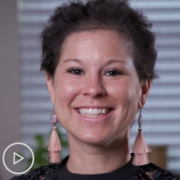Why Speaking Up Matters: Tips from an AML Advocate
Casey Marsh, an AML patient advocate, talks about self-advocacy when diagnosed with a serious illness and provides tips for speaking up to your healthcare team to get your questions answered and overall better care. Download the Find Your Voice Resource Guide here.
Casey Marsh is an AML survivor and patient advocate. Casey is giving back by volunteering for The Leukemia & Lymphoma Society and has been selected as Houston’s honored hero for the 2019 Light the Night.
See More From the The Pro-Active AML Patient Toolkit
Related Resources

An AML Story: Casey Shares Her Stem Cell Transplant Experience |

|
Transcript:
Casey Marsh:
Self-advocacy means to me basically your self-awareness. Knowing what you would want as an outcome, what your goals are, what your objectives are, and what are you going to do to achieve those. So, by being self-aware, you know what you expect out of people, and you know what to make out of a situation. So, if you take that into account with your diagnosis, I feel like your self-advocacy will help basically promote a healthy treatment plan and a healthy recovery.
I would say to those individuals that are nervous to speak up to their healthcare team to think about what really the consequences are by asking a question.
Will they be turned away? Will they not receive treatment if they do? I have never heard a story about that. So, I want them to ultimately think about what are the consequences to asking a question. They’re really not negative, so, therefore, there should not be any type of discouragement to go and ask what you’re feeling. And personally, I think of this as a team, and to build a good team, you have to build that trust, and you have to know everybody on that team’s strengths and weaknesses.
And you know, as a patient, you know your body best. And although you might have a healthcare team that understands and studies the body, they don’t know what you feel. And so, it’s important for you to stay in tune and be a team player and play your part.
And sometimes that part is having to ask those questions that might be a little nerve-wracking, but again, if we don’t ask questions, then we can never find answers. And by doing these questions, we’ve come such a long way in our research. So, I encourage everybody to have a voice. You need to speak up, and don’t be afraid because the consequences are not harmful.











